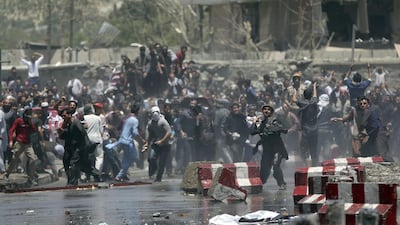KABUL // At least seven people were killed in Kabul on Friday when security forces fired live rounds at protesters trying to march on the presidential palace to demand the government’s resignation over a deadly bombing in the Afghan capital.
Public anger has mounted after a sewage tanker loaded with explosives detonated in Kabul’s diplomatic quarter on Wednesday, killing 90 people and wounding more than 400 others in the deadliest attack in the city since 2001.
Hundreds of people gathered at the site of the bombing on Friday morning to demand the resignation of president Ashraf Ghani, his chief executive Abdullah Abdullah and top security officials, and the formation of an interim government until fresh elections are held.
Clashes broke out in the morning when security forces tried to stop the protesters from marching towards the presidential palace. Officials said this went against an agreement that they would remain at the protest site while a delegation of their representatives were invited to the palace for talks.
Police used water cannon, tear gas and initially fired into the air as protesters threw stones and started fires on the street. Some of the protesters also fired shots, according to police, and a number of weapons were recovered from them.
The health ministry said seven people were killed and 10 were injured in the clashes. Protesters also fired shots near the Emergency Hospital where some of the wounded were taken for treatment, according to police.
Gen Murad Ali Murad, a deputy interior minister who visited the protest site at about 4pm, said armed opportunists had used the demonstration to provoke violence but the situation was under control.
Mr Ghani and Mr Abdullah both issued statements sympathising with the protesters and offering to address their demands through talks.
Mr Abdullah also said protesters would be represented in an investigation into Friday’s shootings.
However, Ahmad Zia Masoud and Abdul Latif Padram, two of the politicians among the protest organisers, have ruled out any solution other than the government’s resignation.
Along with Mr Masoud, formerly the president’s special envoy for good governance, and Mr Padram, an MP for Badakhshan, other politicians backing the protest included Amrullah Saleh, a senior government security official, and Ahmad Behzad, an MP for Herat province.
The violence on Friday is expected to add to anger at the government over its failure to prevent a regular militant attacks in the capital.
Wednesday’s bombing showed the ability of militants to strike even in Kabul’s most secure district, home to the presidential palace and foreign embassies that are surrounded by a maze of concrete blast walls.
“Our brothers and sisters were martyred in the bloody attack on Wednesday, and our leaders are doing nothing to stop this carnage,” said Rahila Jafari, a civil society activist taking part in the protest.
“We want justice, we want the perpetrators of the attack to be hanged to death.”
Shopkeeper Mohammad Anwar said four members of his family were killed in the bombing and he wanted a change of leadership.
Although no group had claimed responsibility for the attack, Afghanistan’s intelligence agency has blamed the Taliban-allied Haqqani Network.
Mr Ghani is expected to approve the execution of 11 Taliban and Haqqani prisoners, a government source said, in apparent retaliation for the bombing.
The Taliban, currently in the midst of their annual “spring offensive”, have denied they were involved.
The Haqqani Network, long thought to have ties to neighbouring Pakistan’s shadowy military establishment, is led by Sirajuddin Haqqani – who is also the Taliban’s deputy leader. The group has carried out numerous attacks in Kabul, including the 2008 bombing at the Indian embassy that killed almost 60 people.
Most of the casualties from Wednesday’s bombing were civilians, including women and children, officials said.
Health officials have warned that some victims may never be identified as their bodies were torn to pieces or burnt beyond recognition.
* With reporting from Agence France-Presse and Associated Press

